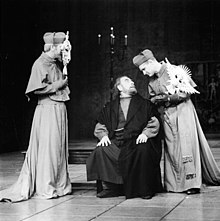
Back مسرحية غاليلي Arabic Животът на Галилей Bulgarian Leben des Galilei German La vida de Galileo Spanish Galileoren bizitza Basque زندگی گالیله Persian Galileo Galilein elämä Finnish La Vie de Galilée French חיי גליליאו HE Գալիլեյի կյանքը Armenian
| Life of Galileo | |
|---|---|
 1971 Berliner Ensemble production | |
| Written by | Bertolt Brecht |
| Characters |
|
| Date premiered | 1943 |
| Original language | German |
| Subject | Social responsibility of scientists |
| Genre | Epic theatre[1] |
| Setting | Renaissance Italy |
Life of Galileo (German: Leben des Galilei), also known as Galileo, is a play by the 20th century German dramatist Bertolt Brecht and collaborator Margarete Steffin with incidental music by Hanns Eisler. The play was written in 1938 and received its first theatrical production (in German) at the Zurich Schauspielhaus, opening on the 9th of September 1943. This production was directed by Leonard Steckel, with set-design by Teo Otto. The cast included Steckel himself (as Galileo), Karl Paryla and Wolfgang Langhoff.
The second (or "American") version was written in English between 1945–1947 in collaboration with Charles Laughton, and opened at the Coronet Theatre in Los Angeles on 30 July 1947.[2] It was directed by Joseph Losey and Brecht, with musical direction by Serge Hovey and set-design by Robert Davison. Laughton played Galileo, with Rusty Lane as Barberini and Joan McCracken as Virginia.[3] This production opened at the Maxine Elliott's Theatre in New York on 7 December of the same year.[3]
In 1955 Brecht prepared a third version. A production, by the Berliner Ensemble with Ernst Busch in the title role, opened in January 1957 at the Theater am Schiffbauerdamm and was directed by Erich Engel, with set-design by Caspar Neher.[4] The play was first published in 1940.[citation needed]
The action of the play follows the career of the great Italian natural philosopher Galileo Galilei and the Galileo affair, in which he was tried by the Roman Catholic Church for the promulgation of his scientific discoveries. The play embraces such themes as the conflict between dogmatism and scientific evidence, as well as interrogating the values of constancy in the face of oppression.
- ^ Birch, Dinah (2009). "Brecht, Bertolt". The Oxford Companion to English Literature (7th ed.). Oxford University Press. pp. 152–153.
- ^ Schuetze-Coburn, Marje. "Bertolt Brecht's Galileo at the Coronet Theatre, February 1998". Feuchtwanger Memorial Library at the University of Southern California. Archived from the original on 2012-02-03.
- ^ a b Atkinson, Brooks (December 8, 1947). "At the Theatre". New York Times. New York, New York. p. 32 – via NYTimes.com.
- ^ Willett (1959, 46–47).
© MMXXIII Rich X Search. We shall prevail. All rights reserved. Rich X Search